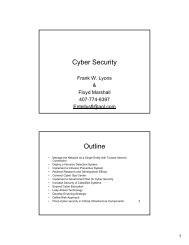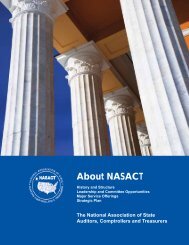Advisory Committee on Tax Exempt and Government Entities (ACT ...
Advisory Committee on Tax Exempt and Government Entities (ACT ...
Advisory Committee on Tax Exempt and Government Entities (ACT ...
Create successful ePaper yourself
Turn your PDF publications into a flip-book with our unique Google optimized e-Paper software.
The Appropriate Role Of The Internal Revenue Service With Respect To <strong>Tax</strong>-<strong>Exempt</strong> Organizati<strong>on</strong> Good Governance Issuesprivate benefit c<strong>on</strong>cerns identified in c<strong>on</strong>necti<strong>on</strong> with a particular organizati<strong>on</strong>’soperati<strong>on</strong>s or proposed operati<strong>on</strong>s <strong>and</strong> if those c<strong>on</strong>cerns are not otherwiseaddressed by the organizati<strong>on</strong>. This could include, depending up<strong>on</strong> the specificoperati<strong>on</strong>al c<strong>on</strong>cerns, the absence of a c<strong>on</strong>flicts of interest policy, independentboard, or review of insider transacti<strong>on</strong>s by independent pers<strong>on</strong>s, failure to usecomparability data, or c<strong>on</strong>temporaneously documenting the review. Where theissue arises <strong>on</strong> determinati<strong>on</strong>, the IRS could if it chose slate the organizati<strong>on</strong> foran early audit or other compliance initiative where the IRS can evaluate whetherthe organizati<strong>on</strong> is meeting the operati<strong>on</strong>al test based <strong>on</strong> its actual track record.We believe this is a preferable approach to requiring or “jawb<strong>on</strong>ing” specificgovernance practices in the determinati<strong>on</strong> phase, although we are c<strong>on</strong>cernedthat this will cause charities to adopt unproven practices that may not makesense in their c<strong>on</strong>text. In any event, we believe it should be limited to situati<strong>on</strong>swhere there are real <strong>and</strong> specific operati<strong>on</strong>al issues that are identified in thec<strong>on</strong>text of a particular organizati<strong>on</strong> <strong>and</strong> where the organizati<strong>on</strong> has not takenother steps to address the c<strong>on</strong>cerns.(11)C<strong>on</strong>sistency <strong>and</strong> Fair Treatment are Critical. Based <strong>on</strong> our interviews <strong>and</strong>pers<strong>on</strong>al experiences, we are c<strong>on</strong>cerned that well-meaning determinati<strong>on</strong>specialists, auditing agents, <strong>and</strong> other IRS pers<strong>on</strong>nel may sometimes beinappropriately requiring organizati<strong>on</strong>s to adopt specific governance practices.While organizati<strong>on</strong>s represented by sophisticated lawyers <strong>and</strong> accountants arelikely to know they can successfully challenge such dem<strong>and</strong>s (although they toomay succumb to the path of least resistance), that is less apt to be the case forsmaller organizati<strong>on</strong>s, which are more pr<strong>on</strong>e to be representing themselves or tohave a volunteer lawyer or accountant assisting who is not necessarilyexperienced in exempt organizati<strong>on</strong> matters. Thus, we have c<strong>on</strong>cerns aboutc<strong>on</strong>sistency <strong>and</strong> potentially disparate treatment, or the percepti<strong>on</strong> of unfairness,in c<strong>on</strong>necti<strong>on</strong> with both the determinati<strong>on</strong> <strong>and</strong> the audit/compliance processes.Accordingly, we encourage the IRS to c<strong>on</strong>sider how to best assure c<strong>on</strong>sistency<strong>and</strong> guard against disparate treatment. In cases involving whether to c<strong>on</strong>diti<strong>on</strong>exempti<strong>on</strong> or c<strong>on</strong>tinued exempti<strong>on</strong> <strong>on</strong> the adopti<strong>on</strong> of specific governancepractices, <strong>and</strong> the c<strong>on</strong>diti<strong>on</strong>s to be imposed, the matters might be reviewed by<strong>on</strong>e office within the IRS based <strong>on</strong> specific guidelines, with records summarizingpast practices <strong>and</strong> a m<strong>and</strong>ate to strive for c<strong>on</strong>sistency. For example, it is notclear to us whether there is a requirement that new organizati<strong>on</strong>s seekingdeterminati<strong>on</strong>s under secti<strong>on</strong> 501(c)(3) have a c<strong>on</strong>flicts policy, whether a policy is<strong>on</strong>ly required based <strong>on</strong> specific facts <strong>and</strong> circumstances (<strong>and</strong>, if so, what theyare), or whether there is more r<strong>and</strong>omness to the requirement, based <strong>on</strong> thedeterminati<strong>on</strong> specialist. Similarly, <strong>on</strong> audit or in the c<strong>on</strong>text of anothercompliance initiative, we do not know if there are st<strong>and</strong>ards as to whatgovernance practices may be required <strong>and</strong> under what circumstances.Important aspects of ensuring c<strong>on</strong>sistency <strong>and</strong> fair treatment are transparency<strong>and</strong> training of IRS pers<strong>on</strong>nel. The applicati<strong>on</strong> of governance principles in thedeterminati<strong>on</strong> process <strong>and</strong> <strong>on</strong> audit/compliance initiatives need to be clear <strong>and</strong>transparent both to charitable organizati<strong>on</strong>s <strong>and</strong> to determinati<strong>on</strong> specialists,ADVISORY COMMITTEE ON TAX EXEMPT AND GOVERNMENT ENTITIES (<strong>ACT</strong>) June 11, 2008 55













